The project is implemented by organisations:
- Interactive Education and Resource Network – IMOR and
- Albanian Foundation for Conflict Resolution and Reconciliation of Disputes – AFCR
IMOR and AFCR have already established cooperation tradition. For the needs of this project, the cooperation was resumed and formalised in a format of Memorandum of Understanding between Interactive Education and Resource Network – IMOR and Albanian Foundation for Conflict Resolution and Reconciliation of Disputes – AFCR.
Organisations established Project Team composed of members from both organisations.
The Project Team promptly discussed, agreed, and prepared a Project Action Plan (Dynamics of Activities) among project partners.
Both organisations (IMOR and ACFR) applied participatory approach in the process of identification of youth, youth leaders, and educators, as this stage was one of the most important stages of the project. Namely, youth/youth leaders and educators were presented the project elements and intended outcomes, so interested individuals could be fully aware of the expectations towards them and had possibility to influence the implementation of the project activities.
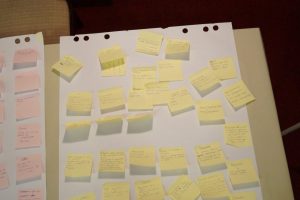
The mobilisation activities in Albania included identification of target groups during field visit to Elbasan. The mobilisation activities organised by the Project Team in Macedonia encompassed field visits to many urban and rural areas, area where coexist various ethnical and religious communities, inclusive and not limiting to Skopje, Tetovo, Gostivar, Skudrinje, Kumanovo, Shtip, Kochani, Negotino, Bitola, Demir Hisar, Prilep, Ohrid. These visits and meetings resulted into identification of youth/youth leaders and educators from 7 different communities (cities/villages in alphabetical order): Bitola, Demir Hisar, Gostivar, Negotino, Prilep, Skudrinje, Shtip. They are coming from the following organisations:
- Secondary Medical School “Dr. Jovan Kalauzi” Bitola
- Secondary Municipal School “High School Josip Broz-Tito” Bitola
- Primary Municipal School “Kole Kaninski” Bitola
- Primary Municipal School “Sv. Kliment Ohridski” Bitola
- Secondary Municipal School “Krste Petkov Misirkov” Demir Hisar
- Secondary Municipal Economics School “Gostivar” Gostivar
- Primary Municipal School “Strasho Pincur” Negotino
- Secondary Municipal School “High School Mirche Acev” Prilep
- Secondary Municipal School “Orde Chopela” Prilep
- Secondary Municipal School “Kole Nehtenin” Shtip
- Primary Municipal School “Blazhe Koneski” Skudrinje
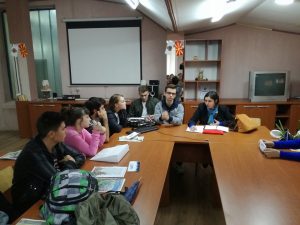
The intention of the Project Team, to have this project as inclusive as possible, was applied starting from the planning stage of the activities and continued throughout the project life span. Acting accordingly, young people and educators were recruited within the project are heterogeneous from different aspects:
- Both genders are represented (female participation is even higher than male participation);
- The age of the participant varies mostly between 12 and 18 years of age, predominantly;
- There are young people from urban areas of big cities, as well as from sub-urban areas of these cities, but also there is significant number of youth from rural areas;
- Some of the participants come from wealthy families, while others from socially endangered / excluded and marginalised ones;
- Members of various ethnic communities that are minority in participating countries were also represented among the pool of young people;
- At the same time, youth involved in this project are coming from different religious backgrounds.
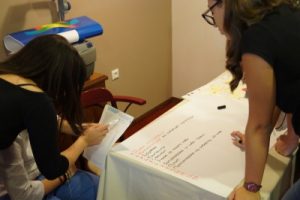
The next step for the Project Team was to prepare youth leaders and educators for implementation of the forthcoming project activities. Within the framework of preparations they were focusing on topics like: how to acquire and use information; how to use online tools and social networks safely and effectively; what are online threats and how to recognise and avoid them; critical thinking; building dialogue across borders and diversities; demonstrating understanding and promoting tolerance; how to recognise radicalism / extremism on the net and report / disseminate warnings about that; how to contribute in preventing radicalisation / violent extremism and potentially counter them; how to do self-monitoring and be aware of threats related to violent extremism; using ICTs for collaborative activities. During preparations, the following UNESCO’s publications we used as reference materials:
- Empowering Youth to Build Peace, A New Integrated Framework of Action;
- Ethical Implications of Emerging Technologies: A Survey;
- Code of Ethics for the Information Society;
- Preventing Violent Extremism in Cyberspace, Final Statement, International Conference on Youth and Information and Communication Technologies.
The reference materials were made available on the collaboration platform at: http://noextremism.pbworks.com/w/page/119638116/FrontPage. Like this, the reference materials were made available for all the participants and wider audience during the project implementation and will be available after the official project end.
The series of camps commenced with the first camp for youth leaders and educators held in Elbasan in Albania on September 4th, 2017. The Second camp was held in Bitola, Macedonia on September 16-17th, 2017, and the third camp was held in Elbasan, Albania on September 28th. The number of participants at the first camp was 41. Youth activists, participants at this camp, were representing different religious communities, like the Orthodox Christians, the Catholic Christians, the Muslim community, the Bektashi community. The number of camp participants in Macedonia, representing the organisations listed earlier in this section, was 88. Representatives from the Secondary Municipal School “Kole Nehtenin” Shtip were not able to join the camp. Regardless of this, they were actively participating all of the other project activities. The number of participants on the third camp, held in “Luigj Gurakuqi” school in Elbasan, was 40. They young leaders were representing various school classes.
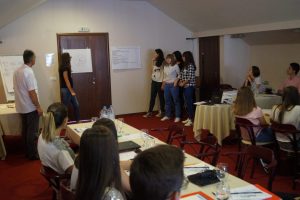
The total number of camp participants adds up to 169, or 149 youth and 20 educators. There were educators (3 educators) and youth leaders (approximately 25 youth leaders) that were fully prepared to actively participate in the project activities, yet were not able to join the camps, due to private commitments, unfortunately. Overall total of prepared and empowered young leaders is exceeding the number of 170 and the number of educators is exceeding 20. The Project Team was and is proud with this accomplishment as it meets the scoping requirements anticipated with the Project Proposal and more importantly, these youth leaders and educators were empowered and were eager to further implement the remaining project activities.
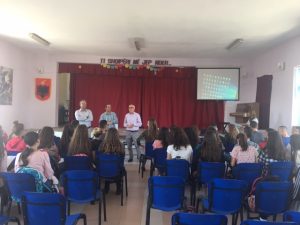
The topics presented and discussed at the camps included the topics in the Project Proposal, in the Work Plan and the topics covered in the preparation phase of the project (how to acquire and use information; how to use online tools and social networks safely and effectively; what are online threats and how to recognise and avoid them; critical thinking; building dialogue across borders and cultures; demonstrating understanding and promoting tolerance; how to recognise radicalism / extremism on the net and report / disseminate warnings about that; how to contribute in preventing radicalisation / violent extremism and potentially counter them; how to do self-monitoring and be aware of threats related to violent extremism; using ICTs for collaborative activities). Youth leaders and educators were using stories, testimonies, videos and other examples of online radicalisation and extremism, as show cases for discussions and for learning from bitter experiences of others.
Another important action for the Project Team was creation of an environment where youth from Macedonia and Albania will be in continuous contact, and at the same time, such environment will facilitate their collaboration and information exchange. For this purpose IMOR created such an environment by securing collaboration platform at: http://noextremism.pbworks.com/w/page/119638116/FrontPage.
The preparations, especially the active training methodologies and inclusive hands-on-experiences applied at camps, created synergy among youth leaders. Aiming at using the momentum created, youth leaders were prepared for dissemination and community outreach during the camp activities.
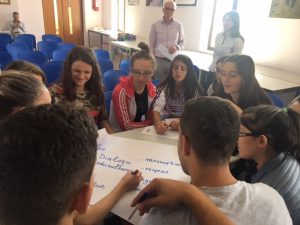
In order to secure wider project publicity / visibility, as well, as succinct project info, project leaflet was designed, printed and distributed among project actors and project beneficiaries.
Youth and youth leaders that undergone preparatory activities and that participated in the camps, supported by the educators, conducted dissemination activities in their environments. Sensitivity of the topic was not an obstacle to scope more than 530 participants with the dissemination activities in Macedonia and Albania. The Project Proposal was foreseeing 400 participants to be disseminated. The energised youth accomplished more than they were expected.
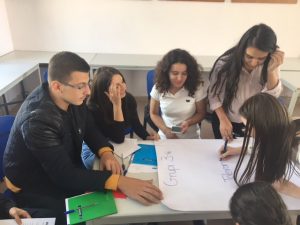
In parallel to the dissemination and community outreach activities, youth continued their intensive discussions of project concern on the pbworks collaboration platform: http://noextremism.pbworks.com/w/page/119638116/FrontPage. The collaboration topics were identified by the youth during camps via a discussion process. The topics are the following:
- Safe and effective use of social networks and online tools
- Online threats
- Recognising violent radicalisation / extremism on the net
- Preventing violent radicalisation / extremism and potentially countering them
More than 170 users have signed up and commenting / discussing on the platform. Sometimes, under the same user name there are several young people, which means that in fact number of youth discussing on the platform is exceeding 200. The number of posts / comments on the platform is higher than 650 and speaks by itself that the intensity of discussions was very high for a relatively short period.
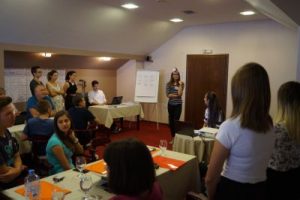
The youth went significantly beyond and above the project expectations. During the course of the activities they prepared a Declaration in which they expressed in their own words their opinion regarding the violent radicalisation and extremism. The draft version of the Declaration was shared widely throughout the network for comments / discussion for almost a month. Following this period, all comments and suggestions were integrated into the final version of the text of the Declaration of Youth from Macedonia and Albania. During the commenting / discussion period of the draft Declaration it was evident for the youth leaders and for the Project Team that Declaration is drawing attention and trigging wider interest in the communities. Therefore, the Project Team prepared and distributed a poster with the Declaration to provide better visibility of the Declaration itself and to increase the impact of the community outreach that was already an ongoing activity.
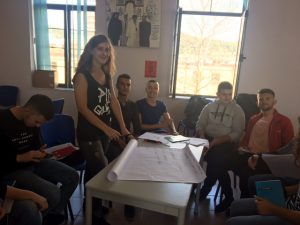
The community outreach actions were not challenging to conduct since the youth and the educators already involved their organisations, families, friends, peers, other organisations. The families of youth got involved so deeply, so they were supporting the outreach. Throughout these actions were outreached more than 1790 citizens in both countries. This number exceeds the intentions and the expectations of the Project Team. To this end, this means that the project expectation is significantly overachieved.
The statements of the parents of some of the youth directly involved in the project implementation are speaking in favour of the significance of the outreach and the extent and quality of the project impact.
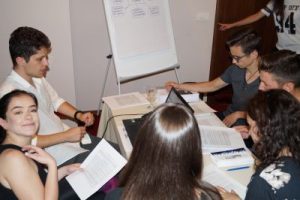
The Project Team was aware of the relevance and importance of the project and was aware of the potential challenges that could have arisen during the project life span. Therefore, all project stages were meticulously planned and carefully realised. The developments “on the field” showed that this was the right approach as youth and educators demonstrated deep commitment to this project and its values. Namely, they shared and disseminated the Declaration widely; acquainted other persons and organisationс with the project significance; attracted a lot of attention on the project and the Declaration; and gathered a lot of support for the Declaration. Or, more specifically, more than 5400 parents, 16000 other adults including educators, 54000 youth and 20 organisations supported the Youth Declaration.
The Project Team was happy and pleased to observe and to conclude that the methodology applied in identification of youth/youth leaders and educators in Albania and Macedonia proved to be the right one. These youth/youth leaders and educators engaged a lot of work and accomplished significant outcomes in implementing of the project activities.
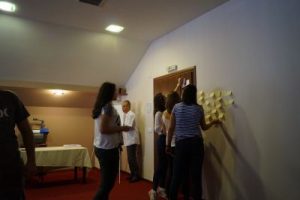
The project impact can be easily recognised through analysis of the received responses on the project survey.
The survey showed that the Project Team adequately addressed safe and effective use of social networks and various online and that youth is now much more competent for safe and secure work on the net (Project Evaluation Responses, question #10, 82% of the marks on level 4, 5 or 6 and Project Evaluation Responses, question #11, 87% of the marks on level 4, 5 or 6).
Some of the participants found it difficult to use English language as an official language of the project and for discussion on the collaborative platform. But, also recognise that this was and is a wonderful opportunity for improvements in the area of English language command. Regardless of the weaknesses in English language proficiency, discussions with youth across the border, or with youth of different backgrounds, was considered as beneficial by youth for improvement of their cooperation abilities, despite the differences (Project Evaluation Responses, question #9, 85% of the marks on level 4, 5 or 6).
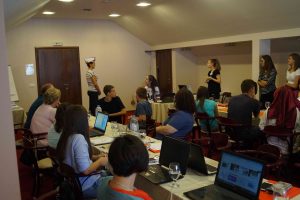
The youth participating in this project have realised that there are many other young people at their age that share the same opinions and concerns about online threats, online violent radicalisation and extremism, how to recognise them, how to help others, how to prevent them, how to counter them. This was logical outcome from the dissemination conducted by youth leaders which enlarged the scope of target group (around 530 youth and youth leaders compared to 400 anticipated with the Project Proposal). This situation got its numerical representation in the project survey vie responses on question #7 (Project Evaluation Responses, where 86% of the respondents marked 4 or higher. Here is important to note that these numbers were already an indication that community outreach will be a success, which actually happened in the field: number of outreached citizens went above 1790 which and is exceeding the number of 1500 citizens planned with the Project Proposal.
The Project Team geared the project activities towards raising awareness about influences, challenges, threats, risks that exist on the net, especially risks arising from violent radicalisation and extremism online. At the same time, the Project Team was working with youth on strengthening their 21. Century skills and competences as these are of great importance for them, not just to recognise the biggest online threats, the personification of the most inhuman monster – violent radicalisation and extremism, but also to help others not to become victims caught in the webs of violent radicalisation and extremis, to prevent these threats and potentially to counter them. All of these efforts were positively accepted and appreciated by youth. More concretely, in Project Evaluation Responses on question #8, 87% of the responses are confirming that project improved their understanding in coping with violent radicalisation / extremism; on question #13, 89% of the respondents think that their capabilities to recognise violent radicalisation / extremism on the net are improved; on question #14, 86% of the respondents think that they are empowered to prevent and/or counter violent radicalisation / extremism online. These numbers are clearly illustrating how significant the impact of this project was on young people, educators, families, outreached communities.
Other facts that are explicitly speaking in favour of the impact of this project are the numbers in Project Evaluation Responses regarding the interest of youth for participating in similar project/s – 90% of the respondents (Project Evaluation Responses, question #5); and 89% of young people would invite and involve their friends in project/s like this one (Project Evaluation Responses, question #6). This information proves that all participants found this project useful and beneficial for them.
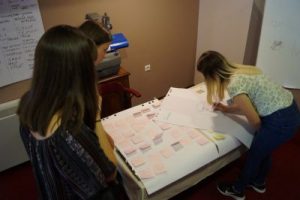
The positive energy and the wish for collaboration with peers across the borders regardless of the diverse backgrounds of peers, that is created among youth leaders goes very much in favour of the justification of the correctness of the approach and all of the efforts engaged by the Project Team. The young people that are energised and empowered within the framework of this project are fully capable of transmitting knowledge, skills, and attitudes to other people in their communities. Although the project is officially ending its life span, youth are still staying in contact and interacting. In other words, 90% of young people consider that this project met their expectations (Project Evaluation Responses, question #4).
The Project Team was continuously monitoring the implementation of each of the activities; comparing the requirements / expectations with the Project Proposal, Work Plan and the Project Action Plan; evaluating whether correction actions are needed or not; and acting upon. The permanent monitoring and evaluation by the Project Team resulted into timely implementation of all project activities. The preparatory activities were thoroughly done and regardless of narrowed implementation period, due to summer holidays, the project activities were completed on satisfaction of all involved parties – the Project Team, youth, educators, parents, communities, direct and indirect beneficiaries. Not only that activities were completed fully and timely, but scoping of youth, youth leaders and educators encompassed higher number in comparison to the Project Proposal; the dissemination activities targeted and involved 30% more participants than in the programme documents; the number of citizens scoped with the community outreach activities exceeded the expected target by 20%.
All of these outcomes are strongly proving that the impact of this project on the youth is significant. At the same time, all these facts are going hand-by-hand with the intent of the project – to contribute in preventing violent extremism and radicalisation on / through Internet via equipping youth from Albania and Macedonia with competences and skills, aiming to further build bridges of peace and understanding by ICTs based collaborative activities.
Provision of safe and secure environment for youth is of paramount importance for the Project Team. Therefore, only limited number of images is published on the web site. In case you are interested in seeing more images, please, request that from us.
Project Evaluation Responses
Project Evaluation Form
Please, answer the following questions by ticking the option that is the most adequate for you.
- Gender male 47% female 53%
- Age 12-14 13% 15-18 77% 19-25 5% more than 25 5%
- Your parents consider this project as useful for youth.
Yes 89% No 1% They are not informed about my participation in this project 10%
Mark 1 is the lowest, mark 6 is the highest.
In cells are written percentages of received responses, respectively.
| Statements | Marks | ||||||
| 1 | 2 | 3 | 4 | 5 | 6 | ||
| 4. | The project fulfilled my expectations. | 1 | 5 | 4 | 12 | 29 | 49 |
| 5. | I am interested in participating in similar projects. | 2 | 5 | 3 | 10 | 31 | 49 |
| 6. | I would like to invite my friends in similar project(s). | 1 | 4 | 6 | 13 | 28 | 48 |
| 7. | I am interested to disseminate, or already disseminated the gained experiences in my community. | 2 | 6 | 6 | 15 | 25 | 46 |
| 8. | Participation in this project improved my understanding of coping with violent radicalisation / extremism. | 3 | 5 | 5 | 14 | 31 | 42 |
| 9. | Participation in this project improved my abilities for cooperation regardless of the differences. | 2 | 6 | 7 | 13 | 21 | 51 |
| 10. | I improved my capabilities for safe and effective use of social networks. | 4 | 7 | 7 | 14 | 26 | 42 |
| 11. | I improved my capabilities for safe and effective use of various online tools. | 4 | 6 | 3 | 16 | 25 | 46 |
| 12. | I improved my capabilities for recognising online threats. | 3 | 5 | 7 | 14 | 26 | 45 |
| 13. | I improved my capabilities for recognising violent radicalisation/extremism on the net. | 2 | 6 | 4 | 15 | 27 | 46 |
| 14. | I am empowered to prevent and/or counter violent radicalisation/extremism online. | 3 | 5 | 6 | 18 | 23 | 45 |
Statements from parents
I am Mihjlovski Igor, a parent of Mihajlovska Marinela, student in SOU Kole Nehtenin from Stip. I was informed about this project from the very beginning. I would like to say that I like the topic of this project. Discussions and online commenting were very good because it is good to see and read the opinions of other participants too. I am terrified that my daughter can become a victim of some violence. I suggest to have education of the students so that they will be familiar with the dangers that can happen online and to be able to take actions against it. I hope that you will continue in the same manner. All praises for the project team.
Mihajlovski Igor
Parent from SOU Kole Nehtenin, Stip, Macedonia
I think that this project is good because it is helping not only the youth but the wider community to realize the importance of radicalism and extremism. With this, we are all learning how to prevent and fight it.
Julijana Velkovik
Parent from Primary School “Strasho Pindjur” – Negotino, Macedonia
As a parent I think that the topic of this project is very important especially in the recent period. I think that the involvement of youth and their active participation will contribute to the resolving society problems with radicalism and extremism. Through dissemination of their experience to other youth they will also have the opportunity to be informed about violent radicalism and extremism.
Silvija Temelkova
Parent from Secondary Municipal School “High School Josip Broz-Tito” Bitola, Macedonia
In the contemporary way of living, we are hearing the terms of radicalism and extremism very often. Although both terms were also used in the past, their frequent usage has culminated in the end of previous and the beginning of the current century. We can hear that because of radicalism and extremism innocent victims are suffering or century old cultural artifacts are destroyed. Unfortunately, children from the very early age are involved in this and they are up brought in terms of higher goals that usually include suicide missions, killings, rapes, etc. With the new technology all this is accessible to everyone. That is why, the education of youth is very important, with the aim to present the harmful influence of the extremism. Youth should understand that only with facing and rejecting radicalism and extremism there will be better world filled with tolerance and understanding. Through education and camps the youths will learn how not to accept the influence of the radicalism and extremism.
Zoran Koteski
Parent from Secondary Municipal Medical School “Dr Jovan Kalauzi”, Bitola, Macedonia
I am a parent of Emin from Skudrinje and I can say that my child, after participating in youth camp, is paying more attention who are his friend on Facebook; he is not publishing photos online and is avoiding online friendships with unknown people. With this, I have realized that there are already positive outcomes for my child and I hope to other children too. These results should be presented to other young and adult people.
Parent from Skudrinje, Macedonia
I am Valentia Ilomanoska, the parent of Mihaela Ilomanoska that was participating in this project. I think that this project has helped a lot to my child and the other participants in finding ways to recognize online threads, how to be careful with communication on social networks, what kind of information to share online, etc. My daughter has become familiar with the terminology of radicalism and extremism. Thank you very much for including my child in such a good and important project. I wish you a lot of successful projects as this one. I would like my child to participate in the similar projects in the future.
Valentia Ilomanoska
Parent from SOU Orde Copela, Prilep, Macedonia
I want to express my satisfaction of the participation of my son in the project “The voice of youth against violent radicalization and extremism”. Through this project the views of the youth are widen about what is happening in the world and what is the Internet’s role, how the social networks can be misused to seduce the youth. This project is helping the young people to be careful, to check the information and not to be involved in something that is not good for them, their families and society in general. It would be good to continue with this kind of projects that will involve as many young people as possible. I would like my son to continue with participation in similar projects.
Dimitar Dimeski
Parent from SOU Orde Copela, Prilep, Macedonia
I am Nikolce Taleski, parent of Tereza Taleska. My daughter has started her participation in this project through camp participation in Bitola. Through her impressions from the camp, she has transferred the positive atmosphere to us. It is good to have this kind of projects so that young people can learn what can happen at social networks and what kind of information can be found online. My daughter has learnt how to use Internet better, how to pay attention of the accuracy of the information that is transmitted; she has information what had happened to other young people that got into troubles etc. The best is that this project can help and save a lot of young people that is important for the parents and the states.
Nikolce Taleski, parent from Bitola, Macedonia
Such activities are useful not only to the students, but to the parents as well; they make us feel responsible with regard to the risks that may be faced by children while using the internet and social networks.
Marjeta Isufi, parent from Elbasan, Albania
It would be interesting to extend these kinds of activities in other schools, I am a teacher and I see that my students have insufficient knowledge about these issues.
Gentiana Lulgjuraj, educator from Elbasan, Albania
Very useful. My daughter told me about all the topics that were discussed in the training. Interesting was the topic on cultural diversity as a very important element in accepting others. We try to teach such values to our children, but it is good when they receive such information at school as well, and feel active in discussions and their friends.
Merita Kushi, parent from Elbasan, Albania
I saw that my son was really engaged in preparing for the community outreach activities and I think that this is a good experience for him.
Gezim Kasa, parent from Elbasan, Albania
We parents are not enough able to manage such situations with the social network problems, because we feel ourselves less informed about this topics. We are focused on our work and sometimes we forget to pay attentions to our children. So, in my opinion it is very important that such kind of activities be extended for a long time and to other schools.
Aurel Zenelak, parent from Elbasan, Albania
In the meetings we felt very good, very comfortable because in this case we changed the roles: the children were teaching us…. This was an amazing experience.
Artan Bilali, parent from Elbasan, Albania
Such kind of activities is very useful to this age group. Moreover, not only youth, but also families and community learn a lot.
Algerta Muzhaqi, parent from Elbasan, Albania